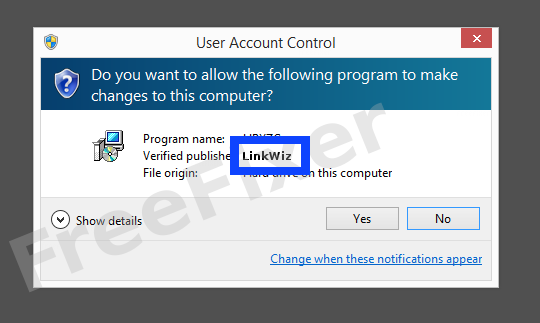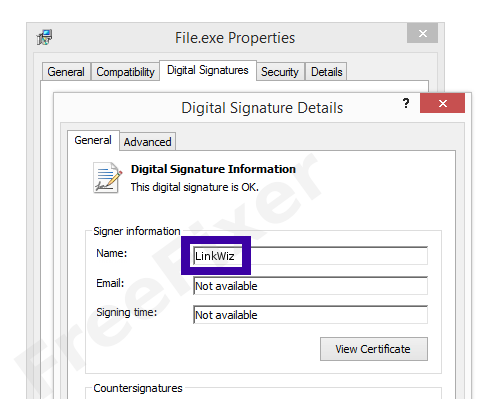LinkWiz - 19% Detection Rate *
Did you just run into a download or a file on your computer that has been digitally signed by LinkWiz? Some of the security products refers to the detected files as InfoAtoms (fs) and a variant of Win32/Adware.Vitruvian.F. The detection rate for the LinkWiz files collected here is 19%. Please read on for more details.
You will typically notice LinkWiz when clicking to run the file. The publisher name shows up as the "Verified publisher" in the UAC dialog as the screenshot shows:

You can view the additional details from the LinkWiz digital signature with the following procedure:
- Open up Windows Explorer and locate the LinkWiz file
- Right-click on the file and select Properties
- Click the Digital Signatures tab
- Click the View Certificate button
Here is a screencap of a file signed by LinkWiz:

As you can see in the screenshot above, Windows reports that "This digital signature is OK". This implies that the file has been published by LinkWiz and that no one has tampered with the file.
If you click the View Certificate button shown in the screenshot above, you can see all the details of the certificate, such as when it was issued, who issued the certificate, how long it is valid, etc. You can also view the address for LinkWiz, such as the street name, city and country.
GlobalSign CodeSigning CA - G2 has issued the LinkWiz certificates. You can also see the details of the issuer by clicking the View Certificate button shown in the screenshot above.
LinkWiz Files
The following are the LinkWiz files I've collected, thanks to the FreeFixer users.
| Detection Ratio | File Name |
|---|---|
| 6/57 | lwsvc.exe |
| 16/55 | lwsvc.exe |
| 13/57 | lwsvc.exe |
| 14/57 | lwnfd_1_10_0_14.sys |
| 5/57 | Au_.exe |
Scanner and Detection Names
Here is the detection names for the LinkWiz files. I have grouped the detection names by each scanner engine. Thanks to VirusTotal for the scan results.
| Scanner | Detection Names |
|---|---|
| AVware | InfoAtoms (fs) |
| Agnitum | PUA.Popad! |
| Avira | ADWARE/Adware.Gen7 |
| Baidu-International | Adware.Win32.Vitruvian.F, Hacktool.Win32.NetFilter.A |
| DrWeb | Adware.Plugin.924, Adware.Popad.10 |
| ESET-NOD32 | a variant of Win32/Adware.Vitruvian.F, a variant of Win32/NetFilter.A potentially unsafe |
| Fortinet | Riskware/Vitruvian, Riskware/NetFilter |
| GData | Win32.Application.Agent.55BEPN |
| Ikarus | PUA.Vitruvian |
| Jiangmin | AdWare/Vitruvian.m, AdWare/Vitruvian.c |
| K7AntiVirus | Adware ( 004b92951 ) |
| K7GW | Adware ( 004b92951 ) |
| Kaspersky | not-a-virus:AdWare.Win32.Vitruvian.g |
| Malwarebytes | PUP.Optional.LinkWiz.A |
| McAfee | Artemis!B90FF8E59050, Artemis!9B111F6B6BB6 |
| NANO-Antivirus | Riskware.Win32.Vitruvian.dnpzum |
| Panda | Generic Suspicious, PUP/LinkWiz |
| Qihoo-360 | HEUR/QVM10.1.Malware.Gen, HEUR/QVM00.1.Malware.Gen, HEUR/QVM42.0.Malware.Gen |
| Sophos | Generic PUA PJ, Generic PUA LD |
| Symantec | WS.Reputation.1 |
| Tencent | Win32.Adware.Vitruvian.Efks |
| TrendMicro-HouseCall | Suspicious_GEN.F47V0415, Suspicious_GEN.F47V0407, Suspicious_GEN.F47V0505 |
| VBA32 | AdWare.Vitruvian |
| VIPRE | InfoAtoms (fs) |
| Zillya | Backdoor.CPEX.Win32.30054 |
* How the Detection Percentage is Calculated
The detection percentage is based on that I've gathered 283 scan reports for the LinkWiz files. 54 of these scan reports came up with some sort of detection. You can review the full details of the scan results by examining the files listed above.
Analysis Details
The analysis is based on certificates with the following serial numbers:
- 1121a175f4ace7f00ec14db23572a3c1d217